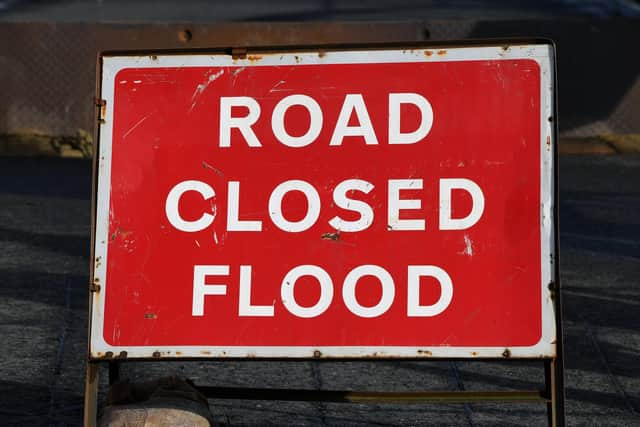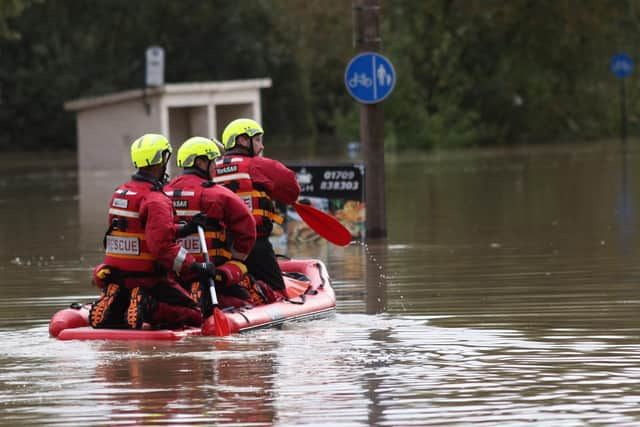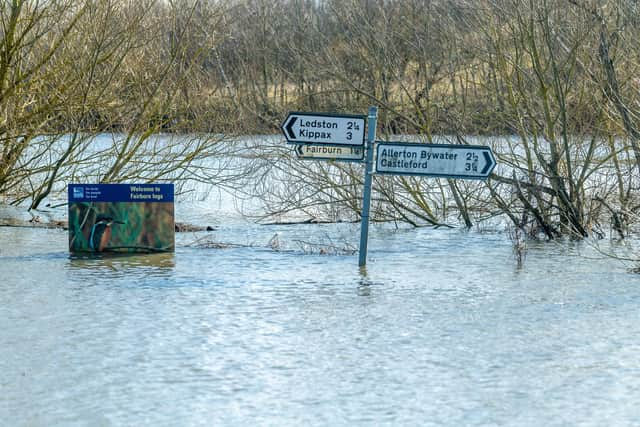Frequency and severity of floods will get worse warns Environment Agency
After this year’s record-breaking weather, the Environment Agency is launching its annual awareness campaign – Flood Action Week – as making just one small change can reduce the effects on homes and families and even save lives.
Around 5.5m homes and businesses in England are at risk of flooding with climate change exacerbating that as we see wetter winters and hotter, drier summers.
Advertisement
Hide AdAdvertisement
Hide AdOne of the key messages of COP28, which gets underway in the United Arab Emirates on November 30, is that the globe must prepare for the effects of increasingly extreme weather.


Data published elsewhere this month by the Copernicus Climate Change Service shows 2023 is near certain to be the warmest year on record.
In just the last few weeks, according to the Met Office, Storm Babet saw the third-wettest independent three-day period in a series for England and Wales since 1891.
Nearly 100,000 properties were protected as part of the Environment Agency’s response to the flooding caused by Storm Babet, while its flood warning service sent out more than 300,000 messages by email, telephone and text.
Around 2,100 properties flooded.
Advertisement
Hide AdAdvertisement
Hide Ad

The Environment Agency says it is working to understand if more could be done to protect these properties better in future but added that householders and businesses can also plan ahead to mitigate the impacts of flooding.
Floods Minister Rebecca Pow said: "I know how devastating flooding can be to homes and businesses – and these extreme weather events are only becoming more common.
“The government is working hard to help the nation to become more resilient, with record investment in flood and coastal erosion risk management in England.
“But there are some simple steps we can all take to be better prepared should flooding occur such as checking your flood risk online and signing up for flood warnings and I would urge everyone to be proactive.”
Advertisement
Hide AdAdvertisement
Hide Ad

Research shows that taking steps to prepare for flooding can reduce the damage to your home and possessions by around 40 per cent.
People can also plan who can support them or which vulnerable family members or neighbours may need help during a flood.
Alan Lovell, Chair of the Environment Agency, said: "With a changing climate, the frequency and severity of flooding will only get worse. So far, this year has seen two devastating named storms, while the Midlands recorded its wettest ever three-day period.
“Our work during Storm Babet protected nearly 100,000 properties and we’re investing millions into keeping communities safe, but we know that some flooding can’t always be prevented. That’s why it’s essential you know what to do in a flood.
Advertisement
Hide AdAdvertisement
Hide Ad“Knowing just one action can reduce the effects on your home and family and even save lives. Anyone can go online to check if they are at risk, sign up for Environment Agency warnings and, crucially, know what they need to do if flooding hits.”
The Environment Agency is continuing its work to help communities become more resilient to extreme weather and rising sea levels.
It has 250 high volume pumps available and is ready to operate flood defences and erect temporary barriers to protect communities where it can.
It uses its flood warning system to alert 1.6m properties directly when flooding is expected.
Advertisement
Hide AdAdvertisement
Hide AdAround 3.4m properties in England are at risk of surface water flooding in particular, which generally occurs after heavy rainfall in urban areas, when water cannot drain away or soak into the ground.
It can happen very quickly and can be difficult to predict.
With just 30cm of flowing water being enough to float a car, drivers are warned to take extra precautions in wet weather and not to attempt to drive through flood water.
Other research shows that the average cost of flooding to a home is estimated at being around £30,000 and the mental health impacts are longer lasting.
As part of Flood Action Week this week, the Environment Agency is reminding people that to prepare for future flooding you should: take steps to protect yourself from future flooding; sign up for flood warnings by phone, text or email and check your long-term flood risk from rivers, the sea, surface water, reservoirs and groundwater.
